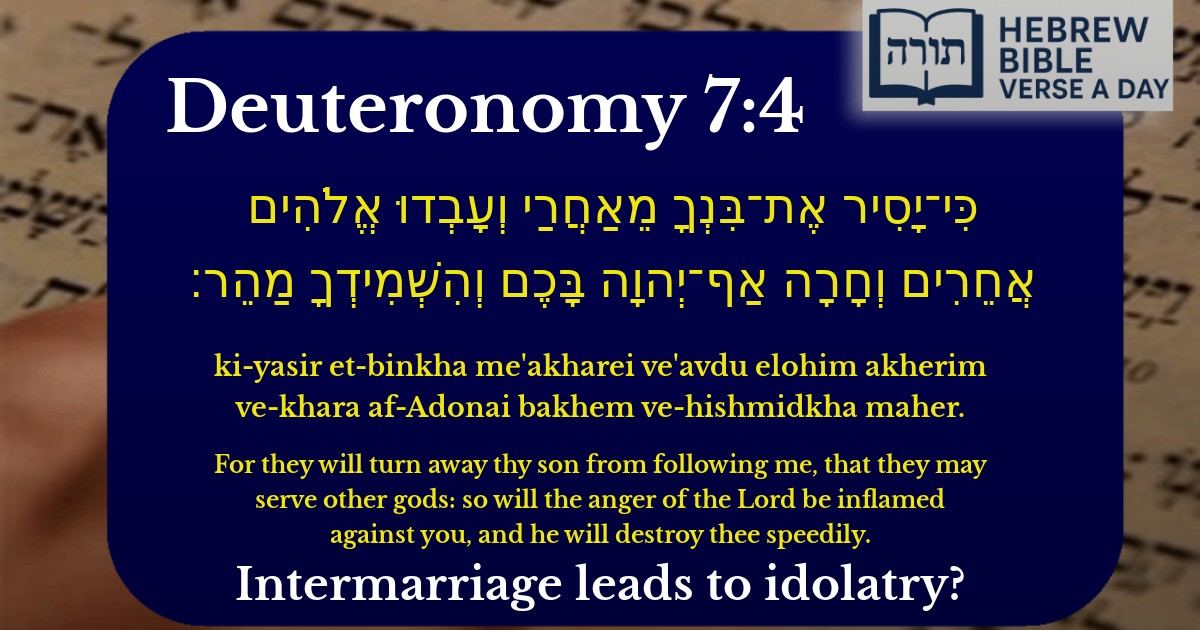Frequently Asked Questions
Q: What does Deuteronomy 7:4 mean?
A: Deuteronomy 7:4 warns against intermarriage with non-Jewish nations because it may lead one's children away from serving Hashem and towards idol worship. Rashi explains that this verse emphasizes the spiritual danger of such unions, as they can result in abandoning Torah values and bringing divine anger upon the Jewish people.
Q: Why is this verse important in Judaism?
A: This verse is important because it establishes a foundational principle in Jewish law (halacha) about maintaining Jewish identity and avoiding assimilation. The Rambam (Hilchos Issurei Biah 12:1-2) cites this verse as a basis for the prohibition of intermarriage, stressing the need to preserve Torah observance and Jewish continuity.
Q: How does this verse apply today?
A: Today, this verse reminds Jews of the importance of marrying within the faith to ensure Jewish continuity and Torah observance. Orthodox Judaism upholds this principle, teaching that a Jewish home must be built on shared values and commitment to mitzvos to prevent spiritual detachment from Hashem.
Q: What can we learn from Deuteronomy 7:4?
A: We learn the importance of safeguarding Jewish identity and ensuring that future generations remain connected to Torah and mitzvos. The Talmud (Avodah Zarah 36b) discusses how foreign influences can lead to idolatry, reinforcing the need to create a strong Jewish environment for children.
Q: Does this verse mean Hashem will punish quickly?
A: Yes, the phrase 'and He will destroy you speedily' indicates severe consequences for turning away from Hashem. The Midrash (Sifrei Devarim 7:4) explains that abandoning Torah values, especially through influences like intermarriage, can hasten divine retribution to prevent further spiritual harm to the Jewish people.


Context in the Torah
The verse (Devarim 7:4) appears in Moshe's warning to Bnei Yisrael regarding intermarriage with the nations inhabiting Eretz Canaan. The Torah emphasizes the spiritual danger of such unions, as they may lead to idolatry and estrangement from Hashem.
Rashi's Explanation
Rashi (Devarim 7:4) clarifies that the phrase "כי יסיר את בנך מאחרי" ("they will turn away thy son from following me") refers to the influence of a non-Jewish spouse on one's children. He explains that the child born from such a union will be drawn after the foreign parent's idolatrous practices, leading the entire family astray. Rashi emphasizes that this is not merely a theoretical concern but a direct consequence of intermarriage.
Rambam's Perspective
Rambam (Hilchot Issurei Biah 12:1-2) expands on this idea, ruling that intermarriage is strictly forbidden due to its inevitable pull toward avodah zarah (idolatry). He cites this verse as a primary source for the prohibition, noting that the Torah uses strong language ("וחרה אף ה' בכם" – "the anger of the Lord will be inflamed against you") to underscore the severity of the transgression.
Midrashic Interpretation
The Sifrei (Devarim 43) connects this verse to the broader theme of maintaining Jewish identity. It teaches that assimilation through intermarriage leads to spiritual destruction, as foreign influences distance a person from Torah and mitzvot. The phrase "והשמידך מהר" ("He will destroy thee speedily") is interpreted as a warning that such behavior hastens divine retribution.
Halachic Implications
Moral Lesson
The Kli Yakar (Devarim 7:4) highlights the psychological dimension: closeness to foreign cultures weakens one's attachment to Torah values. He warns that even if the non-Jewish spouse does not actively promote idolatry, their worldview will inevitably influence the children's spiritual development, leading them away from Hashem.